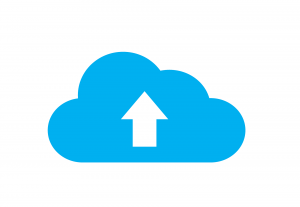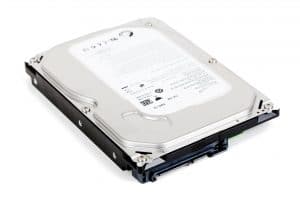How to Choose the Right Backup Solution for Your Service Business
If you have ever lost business data to a hard drive failure, an office fire, a computer virus, or a ransomware attack, you know how important regular backups are. And, over the years, we have seen all of these unexpected disasters happen to our users and bring their business to a halt. Like a good insurance policy, the right backup system, ensures that if catastrophe strikes, you will be able to recover your business data and get back on your feet quickly.
Here is a look at 3 popular backup solutions and the pros and cons of each of them for your business.
1. Cloud Backups
 Although cloud backup solutions are more recent than other backup systems, they are now the most popular choice for consumers and businesses. Options abound for any size business and any data storage needs. Cloud backups offer the security, convenience and flexibility of an offsite backup system that can grow with your business.
Although cloud backup solutions are more recent than other backup systems, they are now the most popular choice for consumers and businesses. Options abound for any size business and any data storage needs. Cloud backups offer the security, convenience and flexibility of an offsite backup system that can grow with your business.
One of the most popular cloud backup services for businesses is Amazon S3, which offers low monthly costs (starting at less than $0.01 per GB stored), live support, high security, and is scalable enough to support any business. Carbonite is another popular option for cloud backups, offering plans that start at $5/month, easy data access and sharing, and 24/7 support. You should shop around to see what type of cloud backup service would best suit the size and the needs of your business. Security, good support, and ease of access to your data should also be taken into account when looking for cloud backup solutions.
Pros
Affordable price. Most cloud backup services require little or no upfront investment compared to other backup and storage solutions and monthly costs are usually low.
No additional labor expenses. A good cloud solution should be simple to set up and use. There is no need for a dedicated employee or an IT specialist to manage it, as the data you choose is automatically backed up to the cloud at regular times.
Secure offsite storage. Since your data is getting stored remotely by the cloud services provider, any disasters at the office will not affect your data and you can recover quickly. Offsite storage is also important in case your locally stored data gets infected by computer viruses, your computers get locked by a ransomware attack, or you are unlucky enough to suffer a fire or a theft of your computer equipment. We have seen these events happen to some of our clients over the years.
Support. You won’t have to figure it out on your own, as cloud backup services offer customer service and support. You should look for a good range of options to contact support, including phone, online chat and email.
Cons
Security and privacy risks. The cloud backup service has access to all your business data, so make sure to check that they protect it with industry-level security measures. Some things to look for are an SSL (Secure Sockets Layer) and making sure that your data is properly encrypted.
2. External Hard Drives
 External hard drives as a backup solution have been around a long time and they continue to be used, mainly because of their affordability and reliability. You can plug an external hard drive into your computer and manually copy data onto the drive or you can set it to back up automatically at set times. However, this might not be the best backup solution for a growing business, as more data will require buying more hard drives and the system can quickly become very complicated. Also in the event of a fire, the external hard drive can be destroyed along with the original computers.
External hard drives as a backup solution have been around a long time and they continue to be used, mainly because of their affordability and reliability. You can plug an external hard drive into your computer and manually copy data onto the drive or you can set it to back up automatically at set times. However, this might not be the best backup solution for a growing business, as more data will require buying more hard drives and the system can quickly become very complicated. Also in the event of a fire, the external hard drive can be destroyed along with the original computers.
Pros:
Affordability. Hard drives are cheap nowadays and keep getting cheaper. You can get a good-quality external hard drive starting at about $60 for 1 TB of storage.
Security. Not being remotely accessible is inconvenient, but it can add another layer of protection. An external hard drive cannot be hacked unless someone gets physical access to it and cyber criminals cannot hold your data hostage for a ransom payment.
Cons:
Limited storage space. Adding storage space for more data requires buying more drives, which can get expensive and inefficient. In addition, if you have multiple computers, you will need a separate hard drive for each one and this would not work well for an office network.
Responsibility. You or someone else in your office has to be responsible for making sure that backups are done regularly on each computer and that the backups are properly stored and readily accessible. There is a lot of room for human error and inefficiency in this system, unless you only have one computer to back up and one person responsible for everything.
Disaster and Physical Damage. A fire or flood in your office that destroys your computers will also destroy the external hard drives, unless you take them somewhere offsite every day. And just like internal storage drives, external hard drives can get damaged and fail, losing your data forever.
3. Network-attached storage devices (NAS)
Network-attached storage (NAS) devices are the most complicated and expensive of the backup options and, therefore, the least popular, especially among smaller businesses. NAS devices for data backup are suited for businesses with multiple networked computers. The device connects to your computer network to share and store files and you can connect additional hard drives to expand storage. Business NAS devices range from several hundred to several thousand dollars and are typically complicated to set up.
Pros:
No ongoing monthly costs. As with external hard drives, there are no ongoing costs once you’ve purchased the NAS device.
Disaster proof. Some NAS devices are guaranteed to withstand some types of disasters, such as fires or flood, which regular external hard drives are not protected against.
Cons:
Complexity of setup. Unless you have an IT person on staff, or are tech-savvy yourself, this may not be the right option for you. And, if anything changes or goes wrong with your network computer setup, you will have to figure it out on your own or pay a tech specialist to resolve the issues.
Upfront cost. Upfront costs are higher than for cloud services or external hard drive backup systems.


